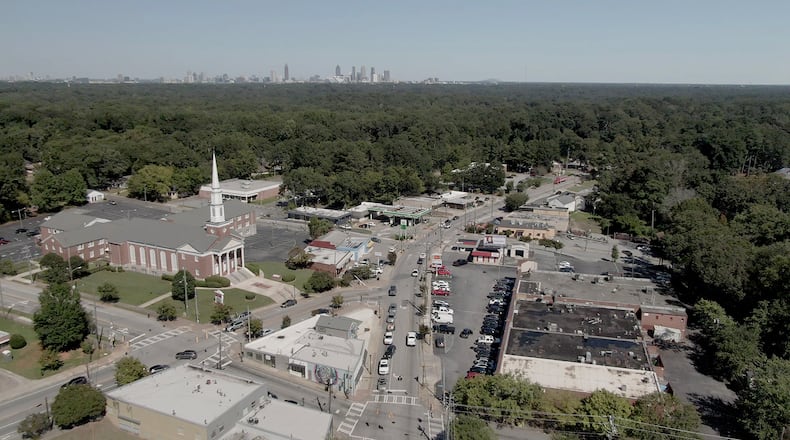John Lewis. Hank Aaron. Andrew Young.
Enormous names in the history of Atlanta, and just a few of the prominent people that have come out of the historic Cascade Heights neighborhood in southwest Atlanta.
The area has long been recognized as a home of Black excellence, helping promulgate the city’s role as a “Black mecca.”
Despite the neighborhood’s prominence, however, some residents say it is a victim of neglect.
Though Cascade Heights boasts manicured, six-figure homes and the second largest tree canopy in Atlanta, the area in recent years has undergone a stagnant commercial district, a litany of unfilled potholes, sidewalk-less streets and overflowing trash bins.
“You’ve got this area with so many influential African Americans, with so much economic potential and growth and development, and we don’t have decent sidewalks,” said Thomas Dortch Jr., a resident of Cascade Heights for over 40 years and the founder of 100 Black Men of America.
But residents new and old determined to improve the community are stepping up, from organizing community cleanups to bringing in new businesses.
Born and raised in Cascade Heights, Thomas “Tre” Dortch III helped start the Cascade Heights Indie Market in March to bring Black businesses into the neighborhood on the third Saturday of every month. The event is an extension of Atlanta Indie Market, a group that has helped organize markets for small businesses across the city for three years.
Several sessions in, the Cascade Heights market has amassed over 100 vendors selling anything from candles to barbecue chicken.
“It was really simply an effort to bring back and revive this neighborhood,” Tre Dortch said. “I wanted people to recognize that there’s so much potential over here, so many opportunities. There are still a lot of properties around here that are not occupied, and people have the opportunity to come and bring positive change.”
Credit: Tyson Horne
Credit: Tyson Horne
He has also organized neighborhood cleanups via social media in an attempt to make the area look more attractive to both newcomers and long-time residents.
“There are people my age and younger who don’t have a sense of pride in this neighborhood, so people are not portraying this neighborhood the way they should,” the 35-year-old explained. “I want to teach people to buy and recycle money in their neighborhood.”
It’s not just longtime residents looking to make a change.
Though Shea Embry has only lived in the community for six years, she said the infrastructure has been an issue for as long as she can remember. Embry recalled instances where she saw older community members walking in the middle of busy Cascade Road due to the lack of sidewalks.
“You can’t have poor access and expect the community to thrive,” Embry said.
Embry has purchased a number of buildings and rented out spaces to new businesses, many started by individuals in the community.
One of those people is Tremayne Perry, the owner of Buzz Coffee and Winehouse and Embry’s neighbor. Perry opened the business two years ago to provide a place where Cascade Heights residents could easily socialize and get a drink near home.
“There are a lack of services in the area, that’s probably the main challenge,” Perry said. “I found myself spending a lot of money in other neighborhoods … so I really wanted a place that was within walking distance or a short drive where I could go have a good cup of coffee or a glass of wine.”
Other businesses that plan to follow Perry’s example and open by next spring include Aiskrimu, an ice cream shop conceptualized by two men from the neighborhood; The Prime Theory Wellness Center, a gym owned by Tre Dortch; and Oretha’s, a restaurant featuring internationally-recognized chef Deborah VanTrece that Embry said will have “your mom’s favorite recipes from around the world.”
“I feel like I was a catalyst to some of the development, it was really just ‘how do I provide more services so people spend more money in my neighborhood?’” Perry said.
Credit: Alyssa Pointer
Credit: Alyssa Pointer
Councilmember Marci Overstreet, who represents a large segment of the neighborhood, said since entering office in 2017 she has encouraged longtime residents to engage in “buy the block” initiatives — creating businesses and spending money in their own neighborhoods.
She has also promoted infrastructure improvement efforts to create sidewalks and better streets in southwest Atlanta, including the years-long Cascade complete streets initiative to fund the road’s repair. Overstreet said she agrees with some resident assessments that southwest Atlanta has been under-supported.
“We can all do better,” Overstreet said of council investments in the area. “What I am more focused on is making sure that we have more of the things that we actually have to get in our car and go [buy].”
Those things include adding grocery stores and more city resources to promote growth in southwest Atlanta, Overstreet said.
Through bringing business and the area’s relatively low crime rate, individuals like Embry, Perry, and other members of the Cascade Heights Community Development Corporation aim to increase attention from others around the city.
Some residents said they want the increases in business to translate into city-funded infrastructure fixes.
In August, City Council approved $20.9 million in road improvements for 3.5 miles of Cascade Road, the major street that bisects the community and is the resource of many resident complaints. Improvements would stretch from Kingsdale Drive near the Perimeter to Ralph David Abernathy Boulevard in West End.
The project includes road resurfacing and restriping, traffic signal upgrades, improvements to bus stops, extended bike lanes, and additional pedestrian safety features.
Perry said he hopes as a business owner that further investment will improve access to nearby services, thereby strengthening the area.
“As more businesses open up and more people spend money in this area, they’re going to continue to demand quality services, demand more leadership from City Hall,” Perry said. “It’s probably going to be a five to 10-year transition, but I do think a lot of attention will be poured into this area.”
Cascade Heights:
Population: 3,110
Median household income: $58,172
Median age: 47
Race: 3.4% white, 95.1% black, 0% Asian, 0.8% Hispanic/Latino (of any race)
Unemployment rate: 5.4%
Poverty rate: 14.5%
Median home value (of owner-occupied units): $165,342
Percent of rental units: 35.7%
Percent of owner-occupied units: 64.3%
Percent of rents above $1000: 55.1%
About the Author
Keep Reading
The Latest
Featured





